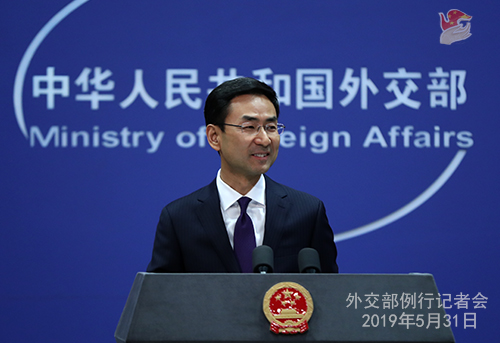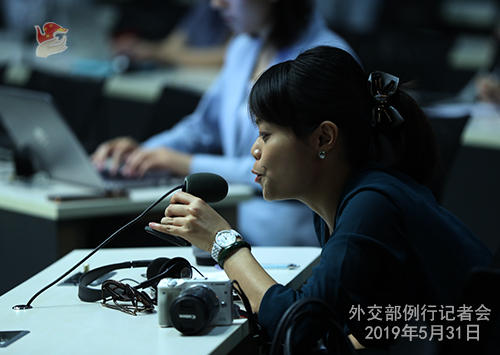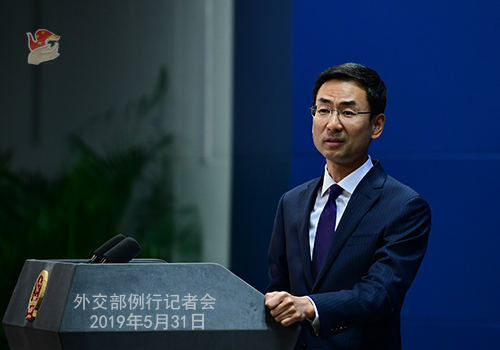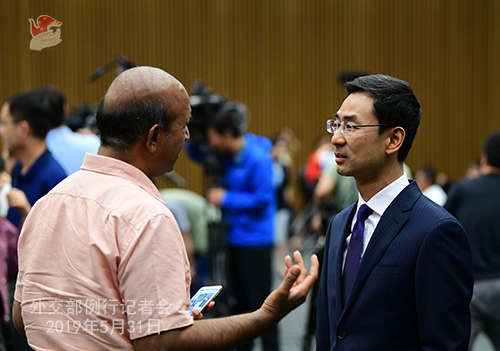| Foreign Ministry Spokesperson Geng Shuang's Regular Press Conference on May 31, 2019 |
| 2019-05-31 18:57 |
|
Q: During the 25th International Conference on the Future of Asia, Malaysian Prime Minister Mahathir Mohamad said that countries with different ideologies need to seek friendship and cooperation. As China opens wider to the world, the East and the West need to learn from each other's cultures and political systems. I wonder what's your comment on that? A: My colleague made a positive response yesterday to Prime Minister Mahathir Mohamad's fair remarks on why the US and the West should not suppress Huawei. Again we highly commend Prime Minister Mahathir Mohamad for his comments you just quoted on dialogue between civilizations. For those preaching the superiority of certain civilization and the so-called "clash of civilizations", we advise them to heed the wise counsel from the senior statesman in his nineties. As the international order and multilateral trading regime is under severe impact from sprawling unilateralism and protectionism, it is all the more important for countries to discard ideological prejudice, step up dialogue and cooperation and deal with challenges together. During the Conference on Dialogue of Asian Civilizations held in Beijing not long ago, all participants emphasized that different countries, ethnic groups and civilizations should respect and learn from each other as equals with an open mind. Following this spirit, China stands ready to work with all countries including Malaysia to safeguard multilateralism and international order, and shoulder our due responsibilities to world peace and development. Today marks the 45th anniversary of the establishment of diplomatic ties between China and Malaysia. Our leaders have exchanged congratulatory messages. China attaches high importance to bilateral relations with Malaysia, a friendly neighbor and important partner for cooperation. Taking this as an opportunity, we will continue to work with the Malaysian side to deepen mutual trust and cooperation, enrich our comprehensive strategic partnership and inject more positive energy into peace and development of the region and beyond. Q: China's Vice President Wang Qishan has recently paid a very successful visit to Pakistan. During the visit, he met with Prime Minister Imran Khan and launched four mega projects under the China-Pakistan Economic Corridor, including the establishment of Huawei Technical Support Center. Agreements were also signed to further cooperation in economic and social sectors. How do you view this visit? A: Like you said, Vice President Wang Qishan's visit to Pakistan was indeed a success. During the visit, Vice President Wang met with President Alvi and had talks with Prime Minister Khan. They had in-depth exchange of views on bilateral relations and international and regional issues of mutual interest, and agreed to deepen high-level exchange, step up strategic communication and advance the China-Pakistan Economic Corridor and practical cooperation in various fields. They also agreed to promote people-to-people exchange, conduct closer coordination in international and regional affairs, and strive for more progress in our all-weather strategic cooperative partnership. Leaders of both sides witnessed the signing of bilateral cooperation agreements in agricultural, customs, disaster relief and other fields. Vice President Wang also met with Governor Sarwar and Chief Minister Buzdar of Punjab. His visit further cemented bilateral friendship and trust, fostered the positive momentum of our ties, and contributed to a closer China-Pakistan community with a shared future in the new era. Q: How does China view Donald Trump's decision to slap tariffs on Mexico over immigration, which was after they had negotiated revisions to NAFTA? Does it in particular perhaps undermine the prospect for China to negotiate a trade deal with the US? A: It seems the US and Mexico are better positioned to comment on this, especially the latter. You may go to ask them how they feel. I would just point out that the US has repeatedly resorted to bullying trade practices and China is not the only victim. As we emphasized repeatedly, China has taken countermeasures to the US unilateralism and protectionism not only to safeguard its own legitimate rights and interests, but also to uphold multilateralism and the global free trade regime.
Q: The US Vice President Pence and the Canadian Prime Minister Justin Trudeau yesterday renewed calls for China to release the two Canadians detained on charge of espionage. Pence also mentioned that should President Trump meet President Xi during the G20 Osaka summit, this would be raised. What's the ministry's response to this? A: We have repeatedly stated China's position on the lawful arrest of Michael Kovrig and Michael Spavor, so I won't repeat it here. I would just remind Canada to realize the consequences of being the cat's paw for the US. We hope it will correct its wrongdoing by taking prompt actions to avoid further harm. As to your question on a meeting between the Chinese and US heads of state on the sidelines of the G20 Osaka summit, all I can say is that they maintain contact through various means. Regarding any specific plan for a meeting, I have nothing to offer at the moment. Q: According to reports, the Tokyo Metropolitan Government just announced that Xiang Xiang, a giant panda born in Japan that was scheduled to be sent back to China next month, will now stay in Tokyo until the end of next year. Is your ministry aware of that and do you have a comment? A: You are the first to bring the news to me. I think that must be good news to the Japanese people, right? Q: Canadian Prime Minister Trudeau brought up the Huawei issue during his meeting with US Vice President Pence, who believed Huawei had potential risks because the Chinese government had been gathering foreign data using Huawei products. I wonder what is your response? Second question, the UK and Canada issued a joint statement yesterday to express their concerns again on the amendment of the Fugitive Offenders Ordinance by the Hong Kong SAR government. Do you have any comment on that? Regarding this issue, has China received concerns or support from foreign consular officials or diplomatic representatives? A: It seems that you are more interested in the second question. I will take that one first. As we repeatedly stated, by amending the Fugitive Offenders Ordinance and the Mutual Legal Assistance in Criminal Matters Ordinance, the Hong Kong SAR government aims to better deal with individual cases and plug the loopholes in the legal system. In this way, the Hong Kong SAR can better cooperate with other countries and regions in fighting crimes and upholding the rule of law, and it will not become a safe haven for criminals. The Chinese central government's position is clear: we completely support the SAR government in amending the ordinances. I'd like to emphasize once again that Hong Kong affairs are purely China's internal affairs. No other country, organization or individual has the right to interfere. We urge the relevant sides to adopt a fair and objective attitude with regard to the lawful amendment of ordinances by the SAR government, respect legislation in the SAR and stop interfering in Hong Kong's internal affairs in any form. On your first question, our position is very clear. We have stated repeatedly that it is neither honorable nor moral for the US to go all out to use state power to suppress a private Chinese company. So far the US has not produced any evidence to support its allegation that Huawei products and services pose a security risk. It has nothing but trumped-up charges. We hope it will stop such wrong practices, which do not fit its status as a major power.
Q: Yesterday you announced President Xi Jinping's upcoming visit to Russia. It has been found that President Xi and President Putin has met twice in two months. Some say that with the ongoing China-US trade friction, China is trying to gain strength in numbers by bringing Russia to its rescue. What is your response to that? A: Did you also find out if the Chinese and Russian heads of state had such frequent meetings before the China-US trade friction? Let me assure you, they did. It has been so all along. As comprehensive strategic partners of coordination, China and Russia have always maintained close high-level interactions. There is an annual exchange mechanism between the heads of state, who also have the customary practice of holding bilateral meetings on the sidelines of multilateral conferences. Therefore, it is completely normal for the two heads of state to meet more than once within a year to coordinate positions on bilateral relations and international and regional issues of mutual concern. Under current circumstances, China and Russia, two permanent members of the UN Security Council, are playing a positive role in upholding multilateralism and defending justice by boycotting and offsetting unilateralism and protectionism with stronger coordination and cooperation. In so doing, they have received universal endorsement from the international community. Q: US President Trump said on May 30 that the US is doing very well with China, and China would love to make a deal with the US. The two sides had a deal and China broke it. The tariffs are having a devastating effect on China. People are leaving the country with their companies for Vietnam and other parts of Asia. China is becoming a very weakened nation. I wonder if you have any comment on his remarks? A: It's not the first or second time the US has made up such lies. Although we have promptly exposed each and every one of them, the US still seems very persistent, or even obsessed with repeating such lies, as though they believe the more they say, the more people will buy them and the more confident they will become. I would like to remind the US side once again not to overestimate their rumor-mongering or underestimate other people's judgement. True confidence comes from following the trend of the times and winning people's support, not repeating lies or creating illusions. The US government's unilateralism and protectionism tendencies have met with strong opposition at home as well as wide criticism globally. We hope the US will come to assess the situation clearly, stop its wrong practices and come back to the right path before it's too late.
|
 |
|



